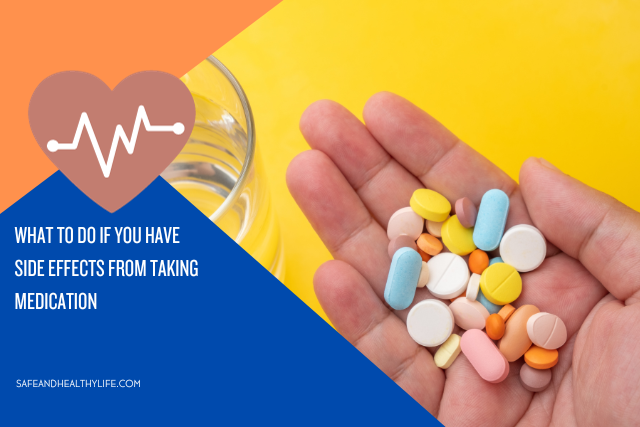
Taking medication is a common part of managing various health conditions, but it can sometimes come with side effects.
If you experience side effects from your medications, it’s essential to know what steps to take to address them effectively.
In this comprehensive guide, you will be provided with valuable insights on what to do if you encounter side effects while taking medication.
1. Recognizing Side Effects
Recognizing the negative consequences of a treatment is the first step in mitigating their impact. The pain caused by side effects might range from minor to severe, depending on the individual.
Nausea, dizziness, exhaustion, and shifts in appetite are some of the most often seen adverse effects.
It is essential to watch how your body reacts to a new medicine and to be on the lookout for any symptoms that are out of the ordinary or unexpected.
2. Keep a Symptom Diary
Maintaining a symptom diary is a crucial step in managing medication side effects. This diary should meticulously record the onset of symptoms, their intensity, and any potential triggers or patterns you notice.
Such detailed documentation empowers your healthcare provider to make informed decisions regarding your treatment.
It aids in discerning whether the side effects directly result from the medication or if there are underlying factors at play.
By having a comprehensive record, you enhance your ability to communicate effectively with your healthcare team, facilitating more accurate diagnoses and tailored solutions to mitigate or address medication-related side effects effectively.
3. Contact Your Healthcare Provider
If you think that your medicine is causing you to have unwanted side effects, the most essential thing for you to do is to get in touch with your healthcare practitioner as soon as possible.
They have the knowledge and skills necessary to evaluate your symptoms and establish whether or not they are, in fact, caused by the medicine.
Make careful to offer specific details about your symptoms, including when they first appeared and how severe they are.
4. Do Not Stop Taking Your Medication All of a Sudden

It is important to let your healthcare practitioner know if you have any adverse effects, but it is also important not to stop taking your medicine suddenly without first consulting with them.
The abrupt stopping of medicine might have unfavorable effects, such as exacerbating the underlying ailment or bringing on withdrawal symptoms.
Your healthcare practitioner will collaborate with you to develop a strategy that is suitable for your situation.
5. Modifications to the Medication
Exploring alternatives with your healthcare provider is a crucial step if you’re experiencing persistent side effects from your medication.
In cases like the common adverse effects of prednisone, a corticosteroid, your healthcare provider may recommend adjusting the dosage or altering the timing of the medication.
These modifications can often help mitigate side effects while still maintaining the medication’s effectiveness in managing your condition.
It’s essential to have an open and informed discussion with your healthcare provider to find the most suitable solution for your specific situation.
6. Adjustments to One’s Way of Life

Alterations to one’s way of life might sometimes assist in reducing the negative effects of the medicine. For example, if you take a medicine that causes digestive troubles, changing your diet to include meals that are smaller but more often spaced out might be helpful.
Alterations to one’s lifestyle, including the introduction of regular physical exercise and the preservation of a normal sleeping pattern, may also be effective in mitigating the symptoms of some adverse effects, such as weariness.
7. Reporting Severe or Unusual Side Effects
Seek urgent medical assistance if you encounter any side effects that are severe or unexpected, particularly if you feel that they might be allergic responses to the medication.
Symptoms such as trouble breathing, swelling of the face or throat, severe skin rashes, or chest discomfort might be present.
In an urgent situation, you should either dial 911 or travel to the closest hospital with an emergency department.
Conclusion
In conclusion, experiencing side effects from medication is not uncommon, but addressing them promptly and effectively is essential.
By recognizing side effects, contacting your healthcare provider, and following their guidance, you can manage and minimize the impact of these effects on your overall well-being.
Open communication with your healthcare team is key to finding the best solutions for your situation. Your health and comfort are paramount, and your healthcare provider is there to support you on your medical journey.
About The Author:
Stacey Smith is a freelance health writer. She is passionate about writing about women’s health, dental health, diabetes, endocrinology, and nutrition and provides in-depth features on the latest in health news for medical clinics and health magazines.




